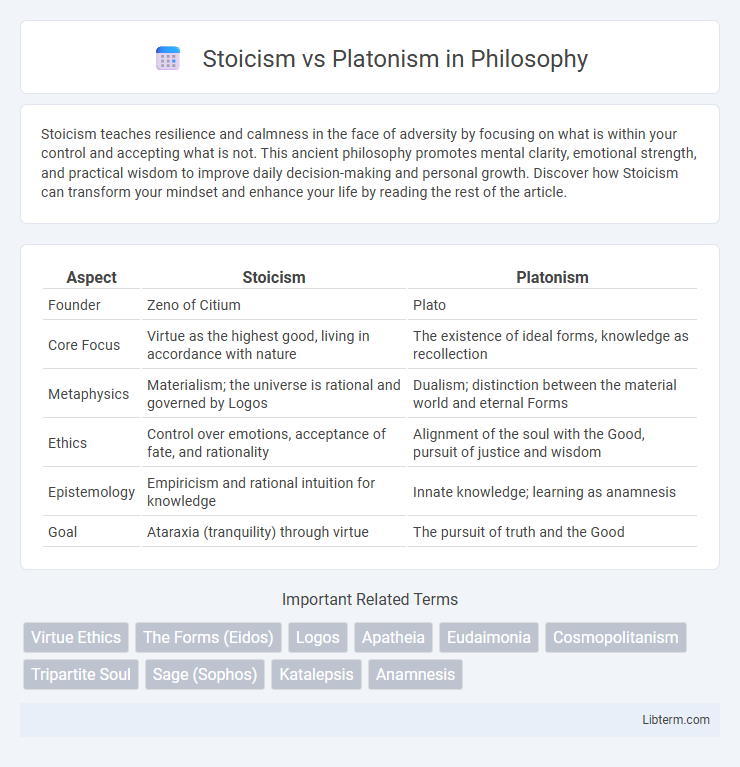Stoicism teaches resilience and calmness in the face of adversity by focusing on what is within your control and accepting what is not. This ancient philosophy promotes mental clarity, emotional strength, and practical wisdom to improve daily decision-making and personal growth. Discover how Stoicism can transform your mindset and enhance your life by reading the rest of the article.
Table of Comparison
| Aspect | Stoicism | Platonism |
|---|---|---|
| Founder | Zeno of Citium | Plato |
| Core Focus | Virtue as the highest good, living in accordance with nature | The existence of ideal forms, knowledge as recollection |
| Metaphysics | Materialism; the universe is rational and governed by Logos | Dualism; distinction between the material world and eternal Forms |
| Ethics | Control over emotions, acceptance of fate, and rationality | Alignment of the soul with the Good, pursuit of justice and wisdom |
| Epistemology | Empiricism and rational intuition for knowledge | Innate knowledge; learning as anamnesis |
| Goal | Ataraxia (tranquility) through virtue | The pursuit of truth and the Good |
Introduction to Stoicism and Platonism
Stoicism, founded by Zeno of Citium in the 3rd century BCE, emphasizes virtue as the highest good and teaches living in harmony with nature through reason and self-control. Platonism, initiated by Plato, centers on the existence of abstract Forms or Ideas as the ultimate reality, prioritizing the pursuit of wisdom and the soul's ascent to truth. These philosophical schools differ fundamentally in their metaphysics and ethics, with Stoicism focusing on practical virtue and Platonism on ideal forms and intellectual contemplation.
Historical Origins and Key Figures
Stoicism originated in the early 3rd century BCE with Zeno of Citium in Athens, emphasizing rationality and virtue as the path to a serene life, while Platonism, founded by Plato in the 4th century BCE, centers on ideal forms and the pursuit of truth beyond the physical world. Key Stoic figures include Seneca, Epictetus, and Marcus Aurelius, who advanced practical ethics and personal resilience. Prominent Platonists such as Plotinus later developed Neoplatonism, expanding Plato's metaphysical ideas and influencing medieval and Renaissance philosophy.
Core Philosophical Principles
Stoicism emphasizes the pursuit of virtue through living in accordance with nature and the practice of self-control, viewing reason as the guiding principle for achieving tranquility and freedom from destructive emotions. Platonism centers on the existence of immutable, perfect Forms or Ideas, asserting that true knowledge is attained by understanding these abstract realities beyond the physical world. While Stoicism prioritizes practical ethics and emotional resilience, Platonism focuses on metaphysical dualism and the realm of ideal Forms shaping material existence.
Views on Nature and Cosmos
Stoicism views nature and the cosmos as a rational, interconnected whole governed by divine reason (logos), emphasizing living in harmony with this natural order to achieve virtue and tranquility. Platonism sees the cosmos as a reflection of eternal, perfect Forms, with the material world being a transient shadow of these ideal entities, prioritizing the soul's ascent to grasp universal truths. Both philosophies highlight a structured universe but differ in Stoicism's focus on immanent rationality and Platonism's emphasis on transcendent abstract realities.
Approaches to Virtue and Ethics
Stoicism emphasizes living in accordance with nature and reason, advocating for virtue as the highest good and a state of inner tranquility achieved through self-control and acceptance of fate. Platonism centers virtue on the harmony of the soul's three parts--reason, spirit, and appetite--where ethical behavior arises from knowledge of the Forms, especially the Form of the Good. Stoics view ethics as practical and accessible through personal discipline, while Platonists see virtue as an intellectual pursuit tied to metaphysical knowledge.
Conceptions of Knowledge and Reality
Stoicism asserts knowledge is derived from sensory perception and rational interpretation, grounding reality in a materialistic and deterministic cosmos shaped by the Logos. Platonism, conversely, posits knowledge as recollection of immutable, abstract Forms that exist beyond sensory experience, emphasizing a dualistic reality split between the sensory world and the intelligible realm. These contrasting epistemologies highlight Stoicism's empirical foundation versus Platonism's idealist ontology.
The Role of Emotions and Reason
Stoicism emphasizes rational control over emotions, advocating for apatheia, a state where reason governs to achieve inner tranquility by minimizing destructive feelings. Platonism views emotions as integral to the soul's tripartite structure, requiring harmony under reason's guidance to attain justice and knowledge. Both philosophies prioritize reason over emotion but differ in the emotional role, with Stoicism seeking suppression and Platonism aiming for balance.
Attitudes Toward Fate and Free Will
Stoicism teaches that fate is a rational, predetermined order governing the universe, and individuals must align their will with this cosmic reason to achieve tranquility, emphasizing acceptance over resistance. Platonism holds that while the material world is subject to fate, the soul possesses innate knowledge and free will, enabling it to transcend fate through philosophical understanding and virtue. Both philosophies acknowledge a deterministic universe, but Stoicism advocates for harmony with fate, whereas Platonism emphasizes the soul's capacity for autonomous moral choice.
Legacy and Influence on Modern Thought
Stoicism's legacy is evident in contemporary cognitive-behavioral therapy, emphasizing resilience and rational acceptance of circumstances, influencing modern psychology and self-help philosophies. Platonism's impact persists in metaphysical and epistemological discourse, shaping Western ideals of forms, truth, and the nature of reality, foundational to educational and philosophical frameworks. Both schools contribute to ethical reasoning and personal development, with Stoicism fostering practical virtue ethics and Platonism inspiring idealism in modern intellectual traditions.
Stoicism vs Platonism: Key Differences Summarized
Stoicism emphasizes practical ethics, focusing on virtue as the sole good and advocating emotional resilience through reason, while Platonism centers on the existence of transcendent Forms and the pursuit of knowledge as the highest good. Stoics prioritize living in accordance with nature and accepting fate, contrasting with the Platonic ideal of ascending the hierarchy of being toward absolute truths. Key differences include Stoicism's materialism versus Platonism's dualism, and Stoicism's pragmatic approach to inner peace compared to Platonism's metaphysical contemplation.
Stoicism Infographic

 libterm.com
libterm.com